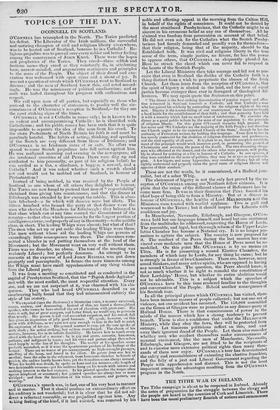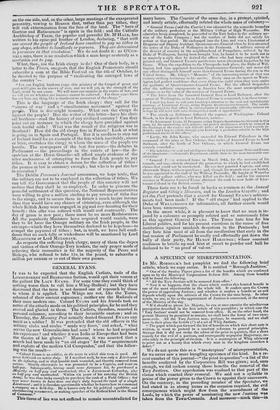and
have been the usual preliminary flourish of notices and summonses on the one side, and, on the other, large meetings of the exasperated peasantry, vowing to Heaven that, rather than pay tithes, they will risk extermination from the face of the land. The "hero of Gortroe and Ratheormac" is again in the field : and the Catholic Archbishop of Tuam, the popular and powerful Dr. WHALE, has written to his episcopal brother of London, declaring, "that with one accord the people of Ireland have resolved to pay no tithes in any shape, whether to landlords or parsons. They are determined Jo persevere in that resolution." We do not doubt it : as O'CoN- NELL says, there is no resolution which a man keeps so sternly as a resolution not to pay. What, then, are the Irish clergy to do? One of their body, in a letter to the Times, suggests that the English Protestants should subscribe a sum at the Bible Festival on the 4th of October, to be devoted to the purpose of "vindicating the outraged laws of the country "— " Let our English brethren (says this minister of the Gospel of peace and good-will) give us the sinews of war, and we will yet, in the strength of the Lord, stand by our cause. We will meet our enemies in the courts of law, and we %lin yet see whether our incomes cannot be collected. For three years there has not been any thing like a simultaneous movement of the clergy."
This is the language of the Irish clergy : they call for the "sinews of war" and a " simultaneOus movement 'S against the peoiale. This is downright insanity. What can the clergy do against the people ? Has the writer of this letter—have his deli- calrethren—read the history of any civilized country ? Can they point out an instance in which the clergy have prevailed against such fearful odds ? What was the result of the religious war in Scotland? How did the old clergy fare in France ? Cook at what is going on in Spain and Portugal. But it is needless to step out of Ireland itself for an example of the fate which inevitably, sooner or later, overtakes the clergy to whom the mass of the people are hostile. The newspapers of the last five years—the debates in Parliament — the proceedings in the courts of law—the de- spatches at the Horse Guards—all afford ample evidence of the utter uselessness of attempting to force the Irish people to pay tithes. It is easy to obtain a decree for the collection of tithes : the process at law is summary enough ; but mho is to put the law in execution?
The Dublin Freeman's Journal announces, we hope truly, that the military are not to be employed in the collection of tithes. We can tell the Government that the people of this country will not endure that they shall be so employed. In order to procure the peaceful settlement of this question, the National Representatives were willing to give a million sterling to pay arrears of tithe due to the clergy, and to secure them in future a much larger income than they would have any chance of obtaining, even although the whole British Army were engaged in pig and cow-hunting for their benefit : this offer was refused with insult and contumely. The day of grace is now past ; there must be no more Rathcormacs. All the popularity Ministers have acquired would vanish, were they to let loose the Orange military on the Irish people, in the attempt—which they have themselves declared to be hopeless—to compel the payment of tithes : but, in truth, we have full confi- dence that no such folly or wickedness will be sanctioned by Lord MELBOURNE or Lord MULGRAVE.
As respects the suffering Irish clergy, many of them the dupes and victims of their Orange-Tory leaders, the only proper mode of relieving their necessities is for the majority of the Peers and Bishops, who refused to take 15s. in the pound, to subscribe a million per annum or so out of their own purses.



























 Previous page
Previous page